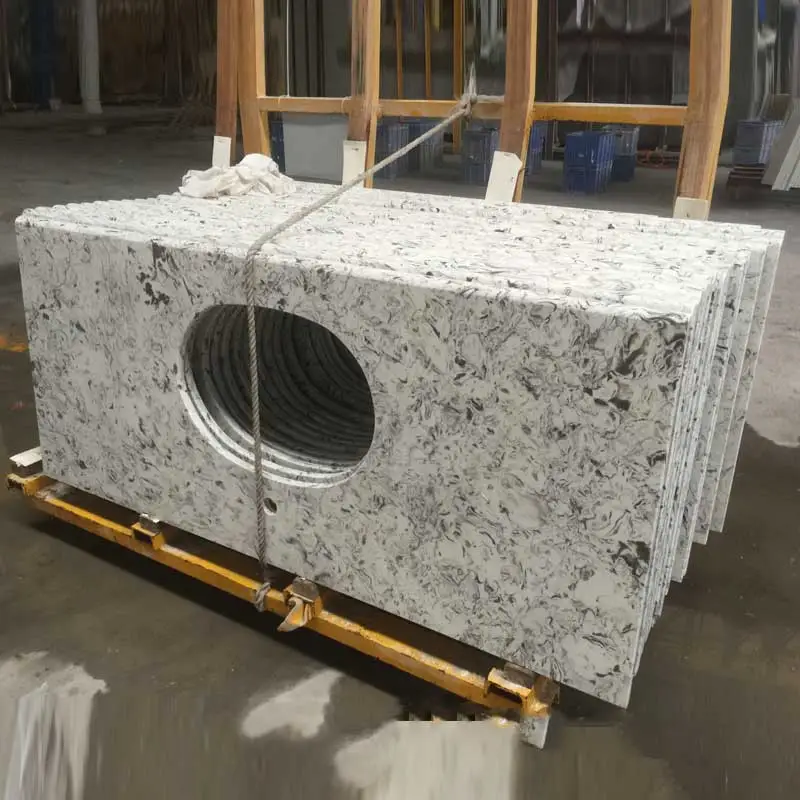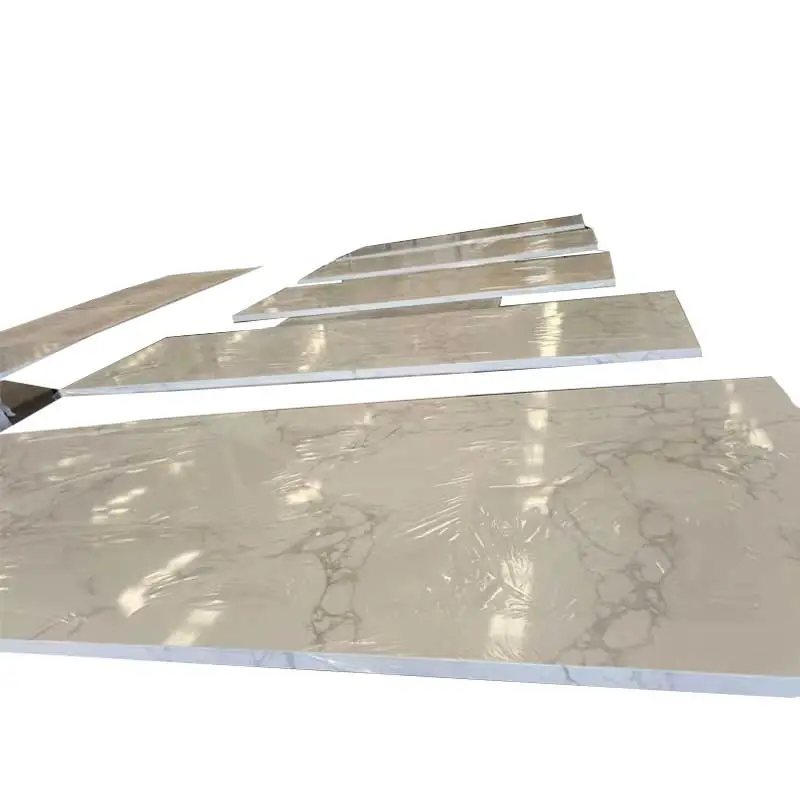In modern home decoration, the choice of countertop materials is crucial. Whether it is the kitchen, bathroom or other work area, the beauty, durability and practicality of the countertop directly affect the quality of the entire space. In the past few decades, granite has been the first choice for high-end countertops, and it is widely favored for its unique natural texture, hard characteristics and durability. However, with the rise of quartz worktops, more and more people are beginning to prefer quartz countertops instead of traditional granite.
So why do people prefer quartz worktops over granite? This article will make a detailed comparison of the physical properties, appearance design, maintenance, price cost, safety and environmental protection of quartz countertops and granite, and comprehensively analyze the reasons why quartz countertops are popular.

Comparison of physical properties of quartz countertops and granite
The physical properties of countertops are one of the primary factors that affect consumer choice. Kitchen and bathroom countertops need to withstand various challenges in daily use, such as hot water, knife scratches, acid and alkali corrosion, etc. Therefore, the hardness, durability, stain resistance and other properties of the material are the key to selection.
Hardness and Scratch Resistance
Granite is a natural stone that was formed over millions of years of geological activity. It is very hard and can resist the wear and tear of daily use. It has a Mohs hardness of between 6 and 7, which means it is very scratch-resistant. However, granite is not as uniformly hard as quartz, and sometimes has weak spots on the surface that are easily damaged by impact or heavy objects.
In contrast, quartz is composed of about 90% to 95% natural quartz particles and 5% to 10% resin binders and pigments. Since the main component of quartz is quartz crystals, its Mohs hardness is as high as 7, which is almost the same as granite, and in some cases even stronger than granite, and its surface hardness is more uniform. Therefore, quartz worktops are more resistant to scratches and collisions in daily use and have a longer service life.
Stain Resistance and Waterproofing
The main problem with granite is its porosity. Although the surface of a granite countertop looks smooth after polishing, it actually still has tiny pores. These pores easily absorb liquids, especially oil, juice, alcohol or acidic substances, which can cause permanent stains. To prevent stains from seeping in, granite countertops usually need to be sealed regularly to maintain their stain resistance.
The non-porous structure of quartz worktops makes them extremely stain-resistant. Quartz countertops have a smooth, well-sealed surface and do not require additional sealing. As a result, quartz countertops are easier to clean and maintain, absorbing little liquid and leaving stains. This is particularly important for everyday kitchen operations, especially when dealing with acids or grease.
Heat Resistance
Granite is naturally heat-resistant because it is a product of cooled volcanic magma. However, although it can withstand high temperatures, long-term exposure to extreme heat (such as placing hot pots directly on it) may still cause cracks or tarnishing of the granite surface.
Although quartz is not as heat-resistant as granite, it performs equally well in everyday home applications. Quartz can withstand the heat generated in ordinary kitchen operations, but excessive temperatures may still damage the countertop surface. Therefore, using heat insulation pads is still the best practice to protect quartz countertops.

Diversity and customizability of appearance design
Aesthetics in home design is one of the important factors for many consumers to choose countertop materials. Whether the color, texture and design of the countertop material can be integrated with the overall decoration style directly affects the final choice of consumers.
Unique texture of natural granite
As a natural stone, granite's greatest charm lies in its unique natural texture and color. Each piece of granite has a unique pattern and tone, and this uniqueness attracts many consumers who pursue personalized decoration styles. However, although this natural texture is beautiful, it also has certain limitations: the color and pattern of granite are limited by geological formation conditions, and the choice is relatively limited, which cannot meet the aesthetic needs of everyone.
Diversification and customizability of quartz stone
In contrast, although quartz stone is a man-made material, it has great flexibility in design. Through different pigments and processing techniques, quartz countertops can simulate the texture and color of various natural stones, and even customize completely unique designs. Quartz stone can not only imitate the texture of granite, but also provide a more consistent and uniform appearance, avoiding the irregular texture and color difference problems in natural stone.
In addition, the color and pattern of quartz worktops can be customized according to customer needs, and consumers can choose more abundant colors and designs to match different home decoration styles. Therefore, the diversity and customizability of quartz stone give it a greater advantage in appearance design and meet the personalized needs of modern home design.
Convenience of maintenance and maintenance
The daily maintenance and maintenance of countertops are important factors that consumers must consider when choosing materials. For busy modern families, low-maintenance and high-durability countertop materials are obviously more attractive.
Maintenance requirements of granite
Due to the porous nature of granite, it needs to be sealed regularly to prevent liquid penetration and stains from remaining. Usually, granite countertops need to be resealed once a year to maintain their anti-fouling properties. In addition, granite countertops are prone to scratches and small gaps, and if they are accidentally hit, it is relatively troublesome to repair.
Low maintenance of quartz countertops
Quartz stone requires almost no special maintenance due to its non-porous structure. Quartz countertops do not need to be sealed as frequently as granite, and only simple daily cleaning is needed to maintain the gloss and cleanliness of the countertops. Wiping with warm water and a neutral detergent is sufficient to remove most stains. Quartz worktops also have extremely high antibacterial properties, because there are no pores for bacteria and mold to grow, which is also a big advantage in kitchen hygiene.
Because quartz countertops require very little maintenance and are extremely stain-resistant, more and more consumers tend to choose quartz as a countertop material.
Price and cost considerations
Price and cost are important factors that affect consumer choices. Although both quartz and granite are considered high-end countertop materials, the difference in price between the two still affects consumer decisions.
Granite price fluctuations
Granite prices are affected by multiple factors, including color, pattern, location of the quarry, and market supply and demand. Some rare colors or textures of granite may be extremely expensive, while common granite types are relatively cheap. However, because granite is a natural stone, its installation cost is usually high and requires professionals to cut and install it.
Quartz countertops cost-effectiveness
Although the price of quartz worktops is not low, its price is more stable compared to granite. Because quartz is produced through an industrialized process, the production cost is more controllable and the price fluctuation is small. In addition, the installation of quartz countertops is relatively simple, which also reduces the additional installation costs. Considering the durability, low maintenance cost and service life of quartz countertops, quartz countertops have a higher overall cost-effectiveness and are gradually becoming the first choice of more and more consumers.

Safety and environmental protection
Modern consumers are paying more and more attention to the safety and environmental protection of home decoration, especially in the kitchen, which is in direct contact with food. The environmental protection and health impact of countertop materials have also become important considerations when purchasing.
Controversy over the radioactivity of granite
Granite, as a natural stone, contains trace amounts of radioactive elements such as potassium, uranium and thorium. In most cases, the radioactivity of granite countertops is within a safe range, but there are still some controversies, especially for sensitive people and children, long-term contact may cause health concerns. In addition, the mining and processing of granite will also have a certain impact on the environment, especially in some quarries that do not follow environmental standards.
Environmental advantages of quartz
Quartz countertops have obvious advantages in environmental protection and health safety. First, the resin and adhesive used in the production process of quartz do not contain harmful substances and will not release harmful gases. Secondly, the non-porous structure of quartz makes it difficult for bacteria to grow in the kitchen environment, ensuring the hygiene of the countertop. In addition, quartz can be partially made of recycled materials, reducing the impact on the environment. Therefore, from an environmental protection perspective, quartz countertops are more in line with the health and environmental protection needs of modern consumers.
Conclusion: Why do people prefer quartz countertops rather than granite?
By comparing the differences between quartz countertops and granite in physical properties, appearance design, maintenance, price cost, safety and environmental protection, the answer is gradually clear: quartz worktops have become the first choice of more and more consumers because of their hardness and durability, anti-fouling and easy cleaning, diversified design, low maintenance cost and high environmental safety. Compared with granite, quartz worktops are not only more excellent in performance, but also meet the needs of modern families for high-quality life and personalized design.
Therefore, although granite used to be the representative of high-end countertops, quartz is gradually replacing granite with its more comprehensive advantages and becoming the mainstream choice in the countertop material market.
Buyers looking for affordable yet high-quality building materials turn to Rongguan for our quartz stone countertops, terrazzo flooring, and Spanish roof tiles. Our wholesale prices, professional service, and ISO-certified production processes make us a trusted supplier across global markets.

